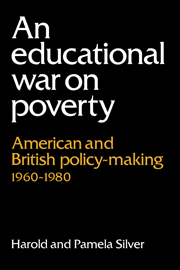Book contents
- Frontmatter
- Contents
- Acknowledgments
- List of abbreviations
- 1 Introduction: a proper complexity
- Part I A pattern of events: United States
- 2 Poverty and education: changing concerns and concepts
- 3 Education: children and intervention
- 4 Learning their way out of poverty?
- 5 Education and the prime target
- 6 An effort to understand
- Part II A pattern of events: Britain
- Part III Following through
- Interviews and consultation
- Bibliography
- Index
5 - Education and the prime target
Published online by Cambridge University Press: 03 October 2009
- Frontmatter
- Contents
- Acknowledgments
- List of abbreviations
- 1 Introduction: a proper complexity
- Part I A pattern of events: United States
- 2 Poverty and education: changing concerns and concepts
- 3 Education: children and intervention
- 4 Learning their way out of poverty?
- 5 Education and the prime target
- 6 An effort to understand
- Part II A pattern of events: Britain
- Part III Following through
- Interviews and consultation
- Bibliography
- Index
Summary
In many respects Title I of the Elementary and Secondary Education Act was the climacteric. John W. Gardner's Task Force on Education, which reported in November 1964, was one of the agents which was pulling the threads together, weighing the precise role and potential of education in achieving the Johnson programme. Its summary begins: ‘This is a fateful moment in the history of American education… To imagine that we can build the Great Society in a few years would be a mistake… education will be at the heart of the Great Society’. There were long processes at work, and Sputnik did not deserve the credit ‘for sounding the alarm… Sputnik was no more responsible for the general ferment that ensued than for the sunshine of 1957 – Sputnik was just there when it happened’ (A: LBJ Lib, WHCF Box 37, pp i, A-II-1). Francis Keppel was fond of describing Khrushchev as America's ‘best education Commissioner’, the space panic as the trigger for the educational developments which followed. Whatever weight is given to that event it is a combination of processes that accounts for the 1965 concentration of the educational attack on poverty. As one analysis of the politics of this educational ‘victory’ concluded: ‘the final passage of the school-aid bill cannot be explained by a single major change at the exclusion of others… victory must be viewed in the context of several inextricably interrelated factors’ (A: Meranto, 1967, 131).
After hearings in sub-committees of the House and Senate, the bill was enacted with extraordinary rapidity in April 1965 clearing the Senate on 9 April by 73 votes to 18.
- Type
- Chapter
- Information
- An Educational War on PovertyAmerican and British Policy-making 1960–1980, pp. 93 - 113Publisher: Cambridge University PressPrint publication year: 1991



